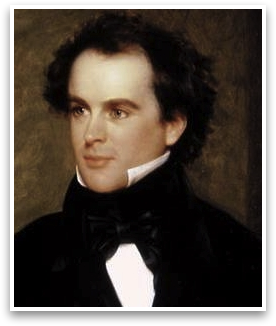
Nathaniel Hawthorne
It is no surprise that the themes of Nathaniel Hawthorne include sin and guilt because his was a soul forever haunted by the weight of his ancestors. Hawthorne's ancestors actively participated in the Salem Witch Trials, and though does not subscribe to the theological foundations of his Puritan ancestors, Hawthorne nevertheless shares their belief in the reality of sin, guilt, and the weight of personal morality. The theme of hereditary guilt would be significant in several of Hawthworne's stories.
Hawthorne had infrequent success as a writer (mostly penning short stories), which led to his employment at a number of less-than-glorious jobs, including surveyer and clerk. Eventually, he found the time (by being fired) to concentrate fully on his writing, which ultimately led to his greatest achievement, The Scarlet Letter.

Themes and Facts
- Felt haunted by the sins of his ancestors, particularly John Hathorne, who was a judge during the Salem Witch Trials.
- Attended Bowdoin College (with little distinction), where his classmates were future president Franklin Pierce and the poet Henry Wadsworth Longfellow.
- Wanted to become a professional writer at an early age, and was one of the first generations of American writers who could do so (though he still had to supplement his salary through a variety of jobs).
- He lived for a brief time at "Brook Farm," which was a community founded on Transcendentalist ideals. He left after six months, calling the experiment a failure, thought it was serve as inspiration for his later novel The Blithedale Romance.
- Most famous for his novel The Scarlet Letter, Hawthorne was a Romantic who was fond of allegory and symbolism, though he generally did not explain his symbolism (e.g. "The Minister's Black Veil"), preferring to let the reader rest in ambiguity.
- Common themes in his writings include guilt, sin, evil, and psychological complexity.
Study Questions
- In "The Minister's Black Veil," why do you think Father Hooper insisted on wearing the veil, even if it cost his "plighted wife"? What were the advantages of wearing the veil?
- What is the attitude of the townspeople towards Hooper's veil? What does this say about their own spiritual priorities? What is the significance of the first paragraph?
- Do we ever really know why Goodman Brown goes into the forest? What is the importance of Hawthorne leaving this answer unclear?
- What elicits the change in Goodman Brown by the story's end? Is Brown justified in his response?
Haunted by the legacy of his Puritan ancestors, Nathaniel Hawthorne translated the theological concepts of sin, guilt, and evil into complex psychological categories.